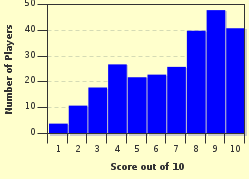Quiz Answer Key and Fun Facts
1. The Committee in the House of Representatives that is responsible for issues such as taxes and international trade is called the Committee on what?
2. Both the House and Senate have treaty ratification jurisdiction.
3. We know that the Vice President would succeed the President should he/she be forced to leave office any reason. Who is next in the line of succession after that?
4. All legislation dealing with funding must start in which body, according to the Constitution?
5. Staffs of members of the U.S. House and Senate are quite small much like in parliamentary democracies.
6. If the Congress cannot pass an appropriations bill to provide funds for a governmental department or organ of the government, what can it pass to keep the provision of spending alive?
7. The House, like the Senate, has the power to filibuster to keep a bill or amendment from coming to a vote.
8. During a State of the Union address who sits behind the President during his speech?
9. Which Speaker of the House later became President of the United States?
10. Legislative differences between the House and Senate are resolved by what?
Source: Author
skipp1
This quiz was reviewed by FunTrivia editor
trident before going online.
Any errors found in FunTrivia content are routinely corrected through our feedback system.


